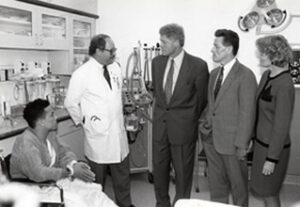Timeline of Major Health Care and Welfare-Related Events during the Florio Administration
1989

November 7
Congressman James J. Florio is elected Governor of New Jersey, defeating Republican Congressman James Courter by a 62-38% margin.
Democrats take control of the Assembly by winning 44 of the 80 seats. The Republicans previously held a 41-39 margin. The Democrats maintain control of the State Senate by a 23-17 margin.
November 15
Just one week following Governor Florio’s election, Blue Cross and Blue Shield, the state’s largest health insurer, applies to raise health insurance premiums up to 33%. The request sparks opposition across the state.
December 3
The state Department of Health requests multiple tax increases to properly fund the Uncompensated Care Trust Fund. The fund was created in 1987 to offset the cost of providing care for uninsured citizens who went to hospitals, but had run out of money.
December
Governor-elect Florio announces first Cabinet nominees. Acting Human Services Commissioner William Waldman continues to head the Department of Human Services.
The Department of Insurance approves Blue Cross-Blue Shield’s request to raise health insurance rates in New Jersey by an average of 24.9%. The request is immediately challenged in court.
1990
January 16
Pledging leadership that is ”disciplined, tough, persistent and honest,” James Joseph Florio takes the oath of office as the 49th governor of New Jersey and in his Inaugural Address calls for a special session of the Legislature the next week to solve the problem of high automobile insurance rates.
Jasper J. Jackson becomes the Commissioner of the Department of Insurance.
January 22
Speaking to a special joint session of the Legislature on his sixth day in office, Governor Florio proposes that drivers be allowed to choose health-insurance rather than automobile-insurance coverage for injuries in automobile accidents, a move that the Governor said would cut costs.
March 2
A bipartisan federal commission on national health care reform, the Pepper Commission, releases a report detailing a plan to repair the nation’s ailing health care system. The commission report stopped short of calling for universal health insurance, but outlined a long-term care program for the elderly and others, a public health program for the uninsured and requirements for employers to provide insurance to employees.
March 26
Alan J. Gibbs becomes the Commissioner of the Department of Human Services.
April 2
Dr. Frances J. Dunston becomes the Commissioner of the Department of Health.
April 9
Samuel F. Fortunato becomes the new Commissioner of Insurance.
April 19
Governor Florio creates an 18-member blue-ribbon Commission on Health Care Costs to investigate the risings costs of Health Care in New Jersey. The Commission, composed of six state department heads, two legislators and nine members of the public, is directed to determine the causes and potential cures for the spiraling costs of health care and present a report by October 1.
May 5
Insurance Commissioner Fortunato approves a revised request from New Jersey Blue Cross Blue Shield to for an average 24 percent rate increase that will affect 350,000 individual customers. New Jersey Blue Cross Blue Shield states that future rate increases may be necessary unless the cost of health care can be reined in.
July 17
Governor Florio signs two bills into law that have the state assume $288 million in county and municipal costs for welfare benefits, psychiatric care and other social services. The legislation requires that the amount saved by municipal and county governments must be passed along to homeowners in the form of property tax relief and cannot be used by the counties or towns to fill budget gaps or start new programs.
September 30
Governor Florio is named vice chairman of the National Governors Association’s Committee on Human Resources, which is charged with shaping a national consensus on providing health care for persons without health insurance.
1991
July 1
Governor Florio signs health care reform legislation that lays “a foundation for universal health care in New Jersey.” The new law mandates low-cost health insurance programs and expanded state and federal medical services for the poor.
July 11
Governor Florio signs the state’s first “living will” law.
1992
January 19
Governor Florio signs a civil rights bill that extends protection to gay men, lesbians and bisexuals, saying that “arbitrary discrimination of any kind” is not welcomed in New Jersey. The amendment to New Jersey’s law against discrimination makes it illegal to discriminate in employment, housing, public accommodations and public contracts against anyone based on sexual orientation.
January 21
Governor Florio signs a package of bills aimed at breaking the “cycle of welfare dependency,” making New Jersey the first state to deny benefits to children conceived once a mother starts collecting benefits
October 16
Bruce Siegel becomes the new Commissioner of the Department of Health.
December 1
William Waldman returns as the Commissioner of the Department of Human Services.

